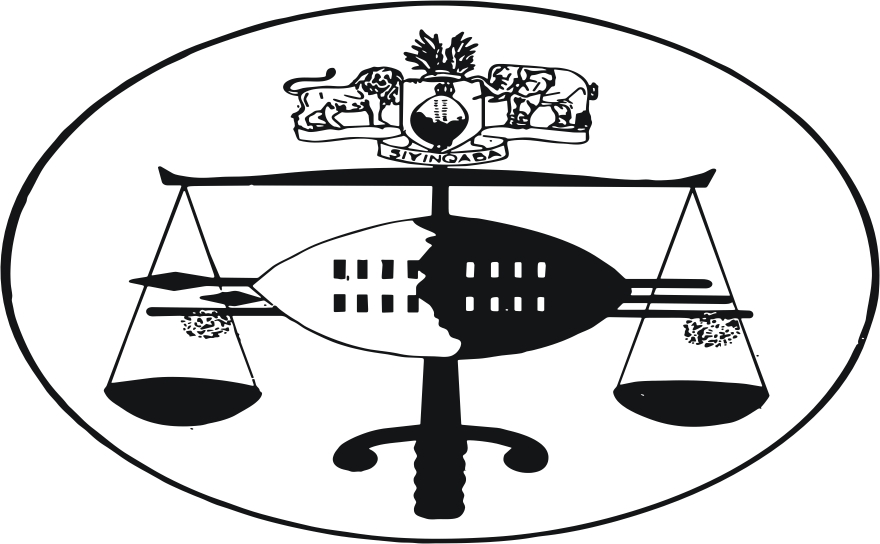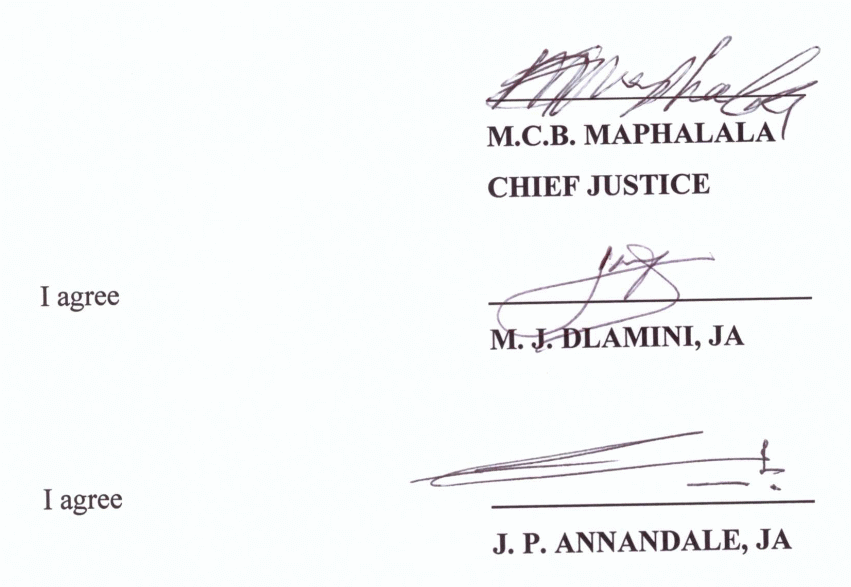- Case summary
- Criminal Appeal – application for bail pending trial – appellant charged with Theft by False Pretences committed whilst out on bail in respect of other offences – bail refused on the basis that the appellant was a repeat offender -held that an appellate court cannot interfere with a decision of a lower court unless there has been a misdirection.

IN THE SUPREME COURT OF SWAZILAND
JUDGMENT
Criminal Appeal Case No: 74/2017
In the matter between:
MUSA WAGA KUNENE APPELLANT
And
REX RESPONDENT
Neutral citation: Musa Waga Kunene vs Rex (74/2017) [2017] SZHC 52 (2017)
Coram : M.C.B. MAPHALALA, CJ
M. J. DLAMINI, JA
J. P. ANNANDALE, JA
Heard : 13 OCTOBER, 2017
Delivered : 20 NOVEMBER, 2017
SUMMARY
Criminal Appeal – application for bail pending trial – appellant charged with Theft by False Pretences committed whilst out on bail in respect of other offences – bail refused on the basis that the appellant was a repeat offender -held that an appellate court cannot interfere with a decision of a lower court unless there has been a misdirection.
Held further that the appellant had breached his bail condition by committing an offence when he was out on bail.
Accordingly, the appeal is dismissed.

JUDGMENT

JUSTICE MCB MAPHALALA, CJ:
[1] The appellant lodged a bail application on the 10th July, 2017 before the court a quo. He was charged with Theft by False Pretences committed in January and May 2017 in Mbabane. It is common cause that at the time of the commission of this offence the appellant was out on bail in respect of the offences committed on the 8th and 10th October 2015. These offences are Extortion, contravention of the Prevention of Corruption Act as well as the contravention of the Money-Laundering Act. The Supreme Court had granted bail to the appellant on the 30th June 2016 in respect of the offences committed on the 8th and 10th October 2015.
[2] When the Supreme Court released the appellant on bail, he was out on bail in respect of other offences committed on the 15th May, 2015. These offences were Defeating or Obstructing the Course of Justice, contravention of the Prevention of Corruption Act and three counts under the Pharmacy Act. Effectively this is the third bail application in respect of offences committed by the appellant whilst out on bail.
[3] It is not in dispute that when the Supreme Court released the appellant on bail on the 30th June, 2016, it observed that the appellant was a repeat offender having committed other offences whilst out on bail.1
Similarly, one of the conditions that was attached to his release on bail was that the appellant should not commit any criminal offence during the period that he was out on bail.2 Incidentally this bail condition has been breached by the appellant with impunity.
[4] Furthermore, the appellant failed to disclose fully, in his bail application, all pending criminal charges against him contrary to the provisions of Section 96 (14) (a) (ii) of the Criminal Procedure and Evidence Act3 as amended which provides the following:
“96 (14) Notwithstanding any law to the contrary:
In bail proceedings the accused, or the legal representative, is compelled to inform the court whether:-
The accused has previously been convicted of any offence; and,
There are any charges pending against the accused and whether the
accused has been released on bail in respect of those charges;
Where the legal representative of an accused on behalf of the accused submits the information contemplated in Paragraph (a), whether in writing or orally, the accused shall be required by the court to declare whether he or she confirms such information or not.”
[5] In his bail application the appellant had only disclosed the charge of Theft by False Pretences for which he was charged; however, he did not disclose offences committed on the 15th May, 2015 being Defeating or Obstructing the Course of Justice, contravention of the Prevention of Corruption Act and three counts under the Pharmacy Act. In addition he did not disclose offences committed on the 8th and 10th October 2015 in respect of Extortion, contravention of the Prevention of Corruption Act as well as the Money-Laundering Act. In paragraph 13 of his founding affidavit, the appellant specifically states under oath that: “I aver that other than the offence for which I had been granted bail, there are no other offences for which I have been granted bail.” This statement is false and misleading.
[6] However, I am not in agreement with the order made by the Learned Judge in his judgment:4
“50. (2) Subject to the outcome of an appeal or review
that the applicant may lodge, the Director of
Public Prosecutions is notified about my finding
concerning the applicant’s failure to comply
with Section 96 (14) (a) of the Criminal Procedure and Evidence Act as amended so that he may act in terms of Section 96 (14) (d) of the Act, if he deems it fit.”
[7] Section 96 (14) (d) of the Act provides as follows:
“96. (14) (d) an accused who intentionally or wilfully –
fails or refuses to comply with the provisions of paragraph (a); or
furnishes the court with false
information required in terms of paragraph (a),
commits an offence and is liable on conviction to a fine not exceeding E5000.00 (Five Thousand Emalangeni) or to imprisonment for a period not exceeding two years, or to both the fine and imprisonment.”
[8] The Crown’s contention is that the appellant failed to disclose pending charges in respect of offences committed in May 2015 contrary to the provisions of section 96 (14) (a) (ii) of the Criminal Procedure and Evidence Act as amended; however, this contention overlooks section 96 (14) (b) of the Criminal Procedure and Evidence Act as amended which allows the accused’s Attorney to disclose the information on his behalf.
It is not in dispute that the appellant’s Attorney disclosed the alleged offences to the court a quo during the bail application before the Learned Judge, the offences committed in October 2015 for which this Court granted bail as well as the offences committed in January and May 2017. In view of the disclosure of the charges made by the appellant’s Attorney, the appellant cannot attract the provisions of Section 96 (14) (d) of the Act as alluded by the Judge. To that extent the Learned Judge committed a misdirection.
[9] His lordship Justice M. C. B. Maphalala ACJ as he then was, in Sibusiso Shongwe v. Rex5, had this to say:-
“19. It is trite that bail is a discretionary remedy; however,
the court is required to exercise that discretion judiciously having regard to legislative provisions applicable, the peculiar circumstances of the case as well as the bill of rights enshrined in the Constitution. The purpose of bail in every constitutional democracy is to protect and advance the liberty of the accused person to the extent that the interests of justice are not thereby prejudiced. The protection of the right to liberty is premised on the fundamental principle that an accused person is presumed to be innocent until his guilt has been established in court. It is against this background that the court will always lean in favour of granting bail in the absence of evidence that doing so will prejudice the administration of justice.”
[10] His lordship Justice M. C. B. Maphalala CJ in Musa Waga Kunene v. Rex6 had this to say:
“10. It is a trite principle of our law that bail is
a discretionary remedy. Similarly, it is
well-settled that an appeal court cannot
interfere with a decision of a lower court
in the absence of a misdirection by the
court in the exercise of its discretionary
power to determine bail. Furthermore,
an accused bears the onus to show on a
balance of probabilities why it is in the
interests of justice that he should be
released on bail.”7
[11] The court a quo did not misdirect itself in dismissing the appellant’s bail application on the grounds of the breach of the bail condition that he should not commit any offence during the period that he is out on bail. To that extent, this Court cannot interfere with the decision of the court a quo.
[12] It is well-settled in our law that the refusal to grant bail and the detention of an accused in custody shall be in the interests of justice where there is a likelihood that the accused if released on bail may undermine or jeopardise the objectives or the proper functioning of the criminal justice system including the bail system8. In determining bail, the court should have regard to the following factors:9 Firstly, the fact that the accused, knowing it to be false supplied false information at the time of his arrest or during the bail proceedings. Secondly, whether the accused is in custody on another charge or whether the accused is on parole. Thirdly, any previous failure on the part of the accused to comply with bail conditions or any indication that he will not comply with any bail condition. Fourthly, any other factors which in the opinion of the court should be taken into account.
[13] It is apparent from the evidence that this is the third bail application lodged by the appellant in respect of offences which were committed when he was out on bail in respect of the other offences. In addition, the appellant breached a bail condition fixed by the Supreme Court that he should not commit a criminal offence when he was out on bail. The release of the appellant under such circumstances is highly prejudicial to the interests of justice and would undermine the criminal justice system and bring it into disrepute; furthermore, members of the public would lose confidence in the administration of justice.
[14] Accordingly, this Court makes the following order:
The appeal is dismissed.


For Appellant : Attorney S. Bhembe
For Respondent : Senior Crown Counsel A. Matsenjwa
1 Paragraph 21 of the judgment
2 Page 21 of the judgment
3 No. 67 of 1938 as amended
4 Paragraph 50 of the judgment of the court a quo
5 Criminal Appeal Case No. 26/2015 at para 19
6 Criminal Appeal Case No 3/2016 at para 10
7 At para 10.5 see also the Zimbabwean judgment of Justice Chidyausiku, Chief Justice of the Supreme Court of Zimbabwe in the case of Learnmore Judah Jongwe v. The State Criminal Appeal Case No. 251 of 2001 at page 7.
8 Section 96 (4) (d)
9 Section 96 (8) of the Criminal Procedure and Evidence Act No. 67 of 1938 as amended
12